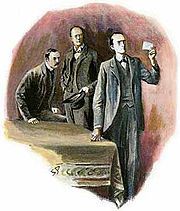
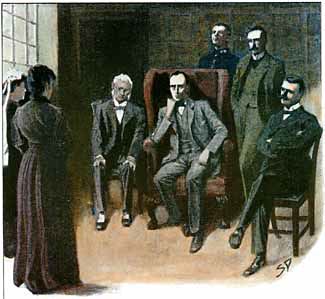
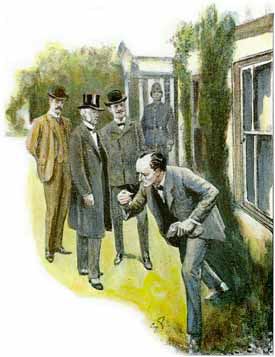
On October 16th, 2009, The Greek Interpreters held a rare Friday meeting at Hershey's Steak and Seafood restaurant in East Lansing. The occasion was special, in that it celebrated a visit by Prof. Donald Yates, our Melas, from his home in California. Donald Yates is Professor Emeritus of Michigan State University's Spanish and Portuguese Department, and translator of the first collection of works by Argentine writer Jorge Luis Borges to appear in English. In 1984 he founded the Napa Valley Napoleons of Sherlock Holmes and has since guided it. His BSI investiture is "The Greek Interpreter". The meeting opened with the customary Canonical Toasts to Mrs. Hudson, Mycroft Holmes (given by Don Yates), the second Mrs. Watson and The Woman. Members then enjoyed an excellent dinner of prime rib, whitefish or grilled chicken, accompanied by spirited conversation. The story on which the evening's quiz and discussion focussed was "The Adventure of the Dancing Men". A short quiz was provided by Don Yates.
 |  |  |
|---|
The discussion following the quiz was wide ranging. The code was a simple substitution cipher, and Donald Yates remarked on the apparent difficulty Holmes had in decoding it, especially since he had written a monograph on the subject. He suggested Holmes was distracted by something particularly shocking, such as the first of the "Ripper" murders. If so, this would require redating the events to the earlier 1887 jubilee.
The cipher also poses other questions. In the transcript printed in the Strand, Holmes' message to Abe Slaney uses the same character for C and H. A similar problem occurs for P and V. Most likely these errors are due to Watson's carelessness in writing the account. The fact that only 17 out of the 26 basic letters of the English alphabet are documented, has naturally led to deep thought and speculation by Sherlockian scholars everywhere. About 30 years ago a leading Danish Sherlockian, Aage Rieck Sørensen, privately published what appears to be the definite analysis of this obscure alphabet. In his paper Mr. Rieck Sørensen devises a coherent icono-semantic system that fills in the missing letters. This complete code is shown below.
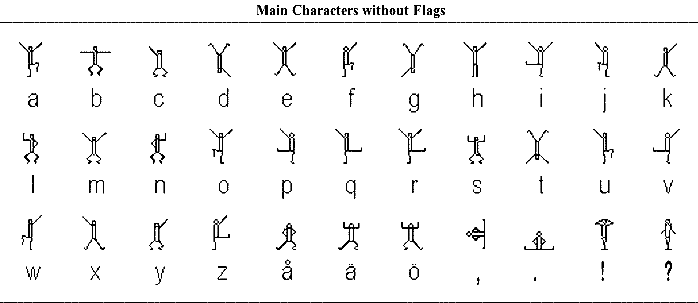
Conan Doyle used to stay in the village of Happisburgh (pronounced haze-bra) on the Nofolk coast, as he relished the solitude there, and he also enjoyed playing golf at nearby Cromer. It is believed he was intrigued by pictures drawn by the landlord's young son, Gilbert Cubitt, and he named one of the main characters in the Adventure of the Dancing Men after the Cubitt family. The tale was set in the fictional village of Riding Thorpe - inspired by the north Norfolk settlements of Ridlington and Edingthorpe.
Other topics that were raised in the discussion included: (i) Did revolvers equipped with "ejectors" exist, yielding the cartridge found by Holmes. (ii) Why did Holmes dismissal of the possibility of detecting powder residues on Elsies hand? (iii) Was Cubitt's proposal to have his farmhands catch the intruder sensible?
 | 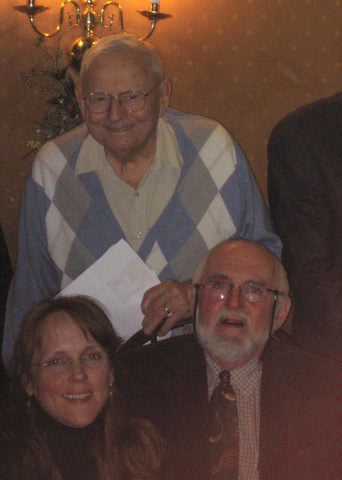 | 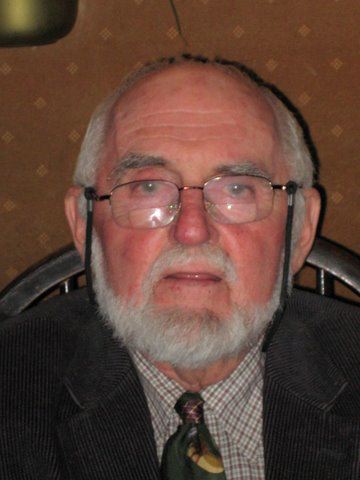 | ||
|---|---|---|---|---|
Meeting Attendees | Charlie Press with | Donald Yates |
||
| photographs provided by Bev & Michael Ellis | ||||
The meeting concluded with Professor Yates reading Vincent Starrett's "221B" poem, followed by our singing of The Anthem.
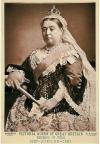
Attention: if you would like to hear a podcast of an interview with Howard Brody regarding the Institute for Medical Humanities that he directs click here.